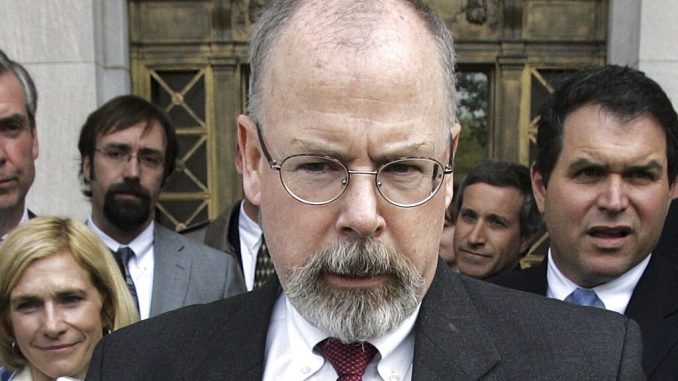
WASHINGTON, D.C. — A former FBI lawyer will plead guilty to making a false statement in the first criminal case arising from U.S. Attorney John Durham’s investigation into the probe of ties between Russia and the 2016 Trump campaign.
Kevin Clinesmith is expected to plead guilty to one count of making a false statement related to the altering of a government email about a former Trump campaign adviser who was a target of FBI surveillance, attorney Justin Shur told The Associated Press.
Clinesmith is being charged in federal court in Washington and is expected to plead guilty to one county of making a false statement, his attorney Justin Shur told The Associated Press.
Durham, the U.S. attorney for Connecticut, had no comment, a spokesman said. It remains unclear what additional charges, if any, Durham might bring.
The investigation has proceeded alongside a parallel effort by Senate Republicans to discredit the Russia probe and as Attorney General William Barr has escalated his own criticism of the FBI’s probe.
Barr foreshadowed the legal action in a Fox News Channel interview on Thursday night in which he said there would be a development Friday that was “not earth shattering” but would be an indication that the investigation was moving along.
Justice Department policy directs prosecutors not to take investigative steps for the purpose of affecting an election and frowns upon taking public actions in the weeks before an election. But Barr has said he did not feel constrained by that policy in part because the presumptive Democratic presidential nominee, former Vice President Joe Biden, is not a target of Durham’s investigation, and Barr has signaled that he will look to make Durham’s findings public before the election.
Clinesmith was referred for potential prosecution by the department’s inspector general’s office, which conducted its own review of the Russia investigation.
That review found that the Russia probe was opened for a legitimate reason and did not find proof of political bias, but it also concluded that the FBI made significant errors and omissions as it applied for secret national security warrants to eavesdrop on former Trump campaign adviser Carter Page.
Specifically, the inspector general accused Clinesmith, though not by name, of altering an email about Page to say that he was “not a source” for another government agency. Page has said he was a source for the CIA. The Justice Department relied on that assertion as it submitted a third and final renewal application in 2017 to eavesdrop on Page under the Foreign Intelligence Surveillance Act.
Clinesmith told the inspector general that from his conversations he did not understand Page to be a source, or a “recruited asset,” or to have a direct relationship with another government agency. But that relationship was seen as something important to disclose to the FISA court, especially if Page was being tasked by the government to have interactions with Russians.
“Kevin deeply regrets having altered the email,” Shur said. “It was never his intent to mislead the court or his colleagues, as he believed the information he relayed was accurate, but Kevin understands what he did was wrong and accepts responsibility.”
Durham is the U.S. attorney for Connecticut and a veteran prosecutor with a history of special assignments from Washington. Former Attorney General Eric Holder selected him during the Obama administration to investigate the CIA’s harsh interrogation techniques of terror suspects and the destruction of videotapes documenting that interrogation.
Barr appointed Durham just weeks after special counsel Robert Mueller concluded his nearly two-year investigation. Barr signaled his skepticism with the Russia investigation right away, concluding that Trump had not obstructed justice.



